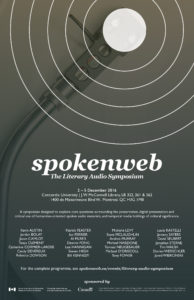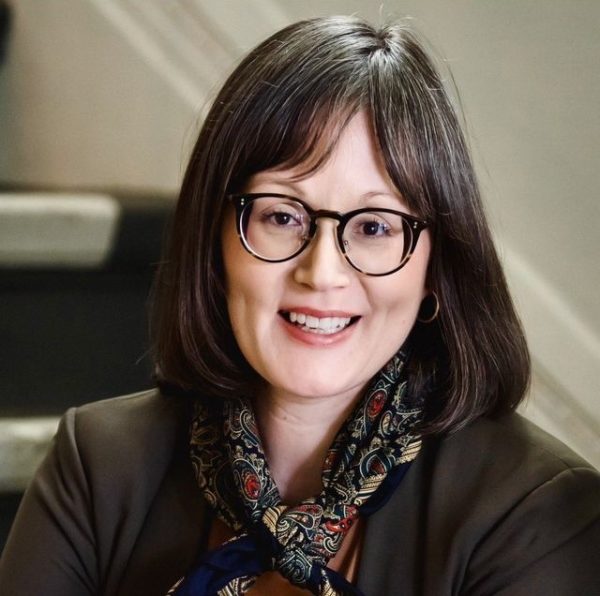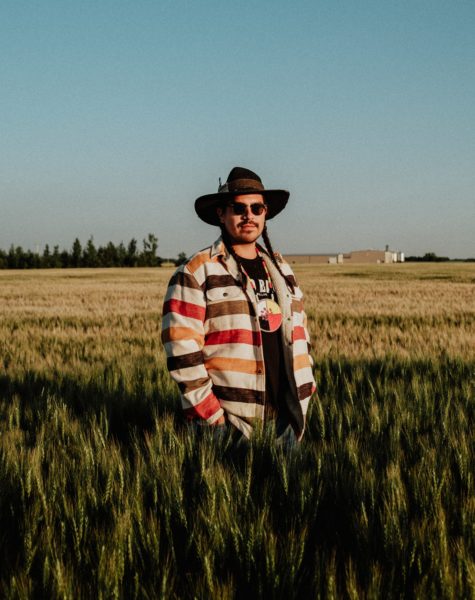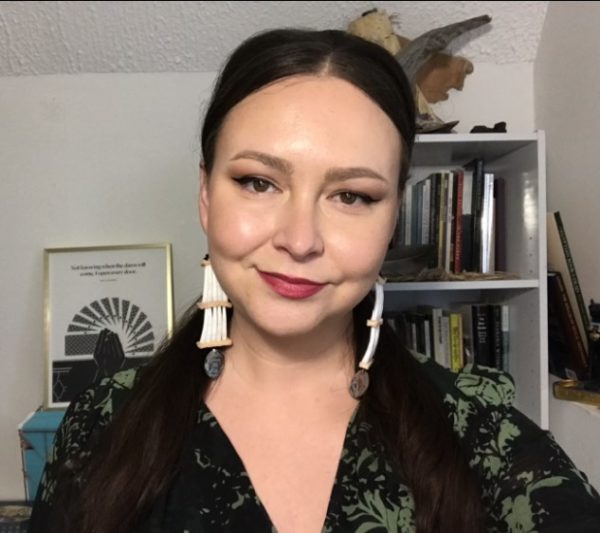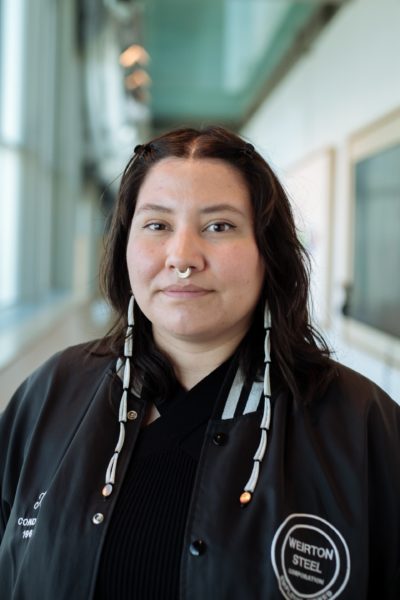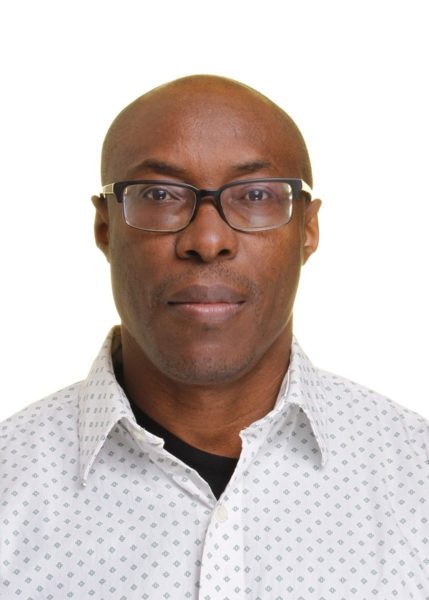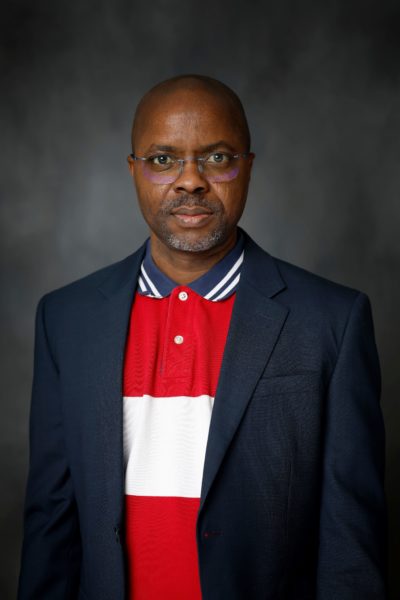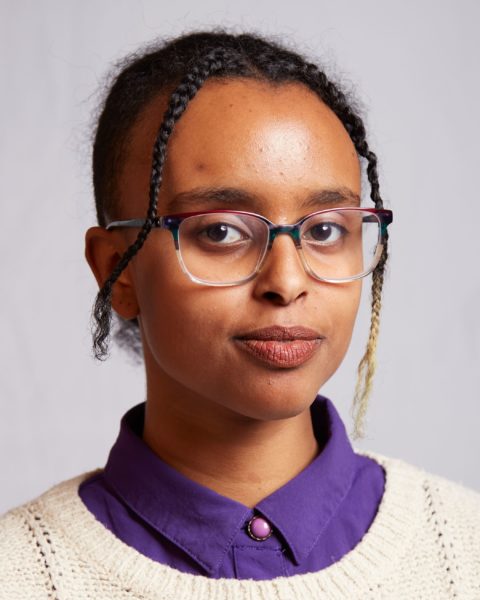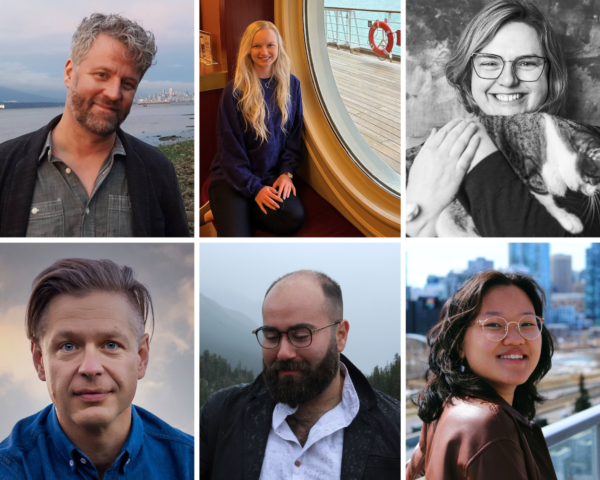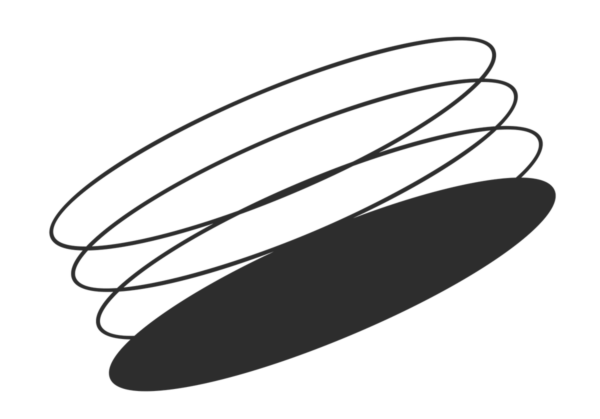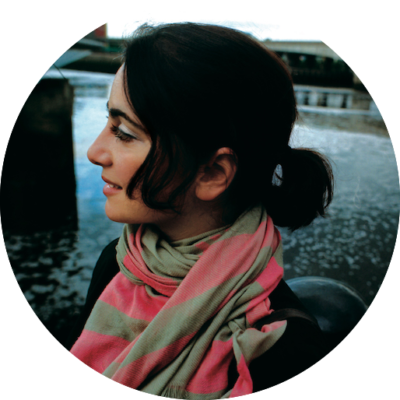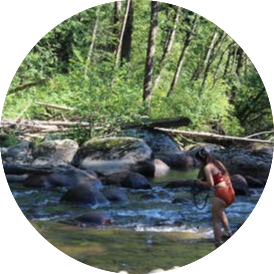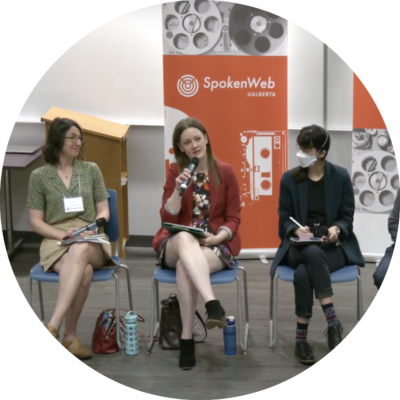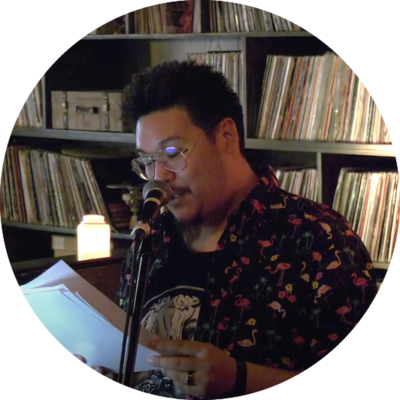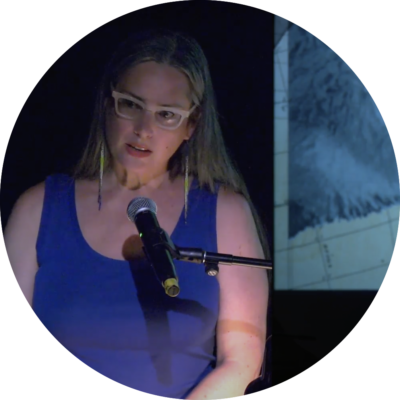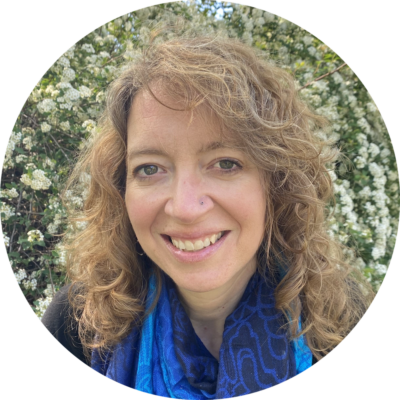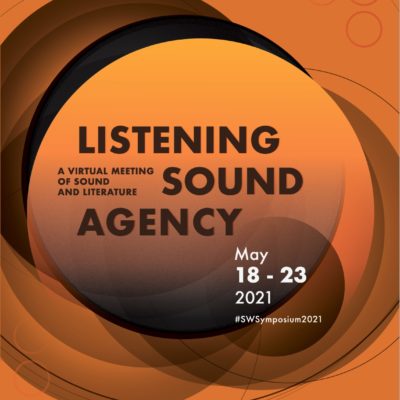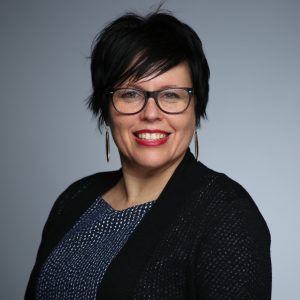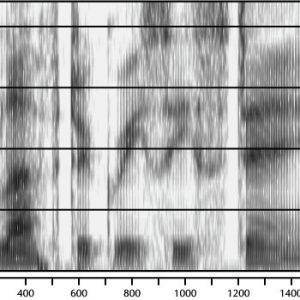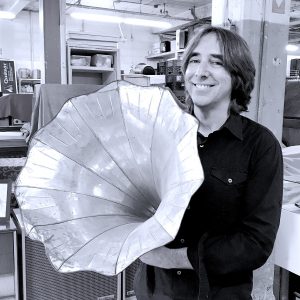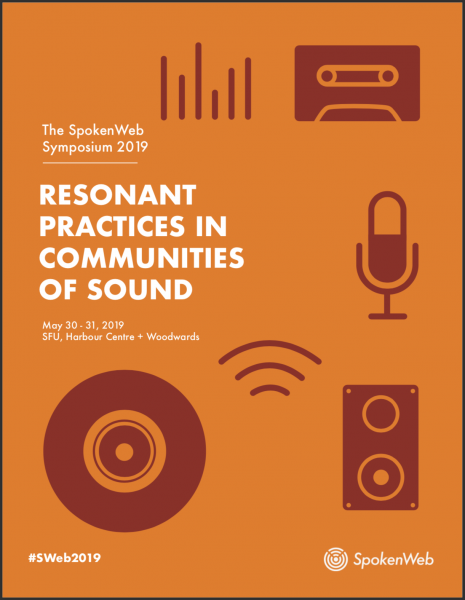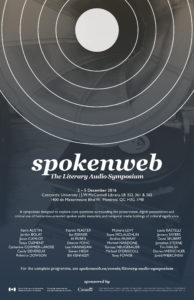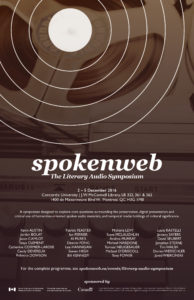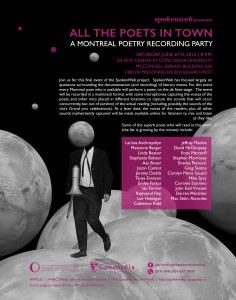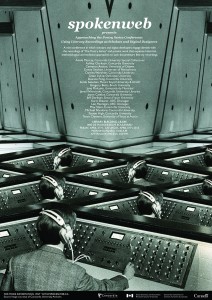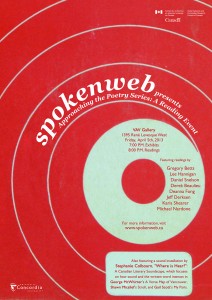KEVIN AUSTIN (Concordia U)
“Ear Training in Electroacoustics”
This talk will introduce a variety of issues surrounding ‘ear-training’, or rather, refined hearing, in the domain of electroacoustics (referring to both acoustical engineering and, with examples, electroacoustic music). The starting premise of this talk is that hearing / listening, is all perception. The presentation will frame core questions surrounding ‘how’ auditory perception functions, and therefore considerations of the applicability of different kinds of tools to different data sets. This will include matters of sonic identity and character, and sonic transformation with understanding more deeply various models applicable to pattern identification for manual and automated sound searches. The talk will also include a brief exploration of how symbolic notation / representation may be approached to develop concepts for multi-dimensional hearing, the fundamental proposition being that ‘how’ we hear will be at the educational core of auditory perception. The refinement of hearing increases the depth of perception, a skill applicable across disciplines, from music to text-sound composition, to spoken literature.
Kevin Austin, Professor of Music at Concordia University, is a Montreal-based composer, educator, arts animator and electroacoustics archivist. A specialist in electroacoustics – all areas, composition, theory [electroacoustics and music], ear-training and music history. For 25 years he was the Coordinator of the Concordia Electroacoustic Studies area at Concordia University. He was a Charter and Founding Member of the CEC (Canadian Electroacoustic Community), and the director of The Concordia Archival Project (CAP). This important initiative, funded by Heritage Canada through Canadian Culture Online, using the Concordia Tape Collection – over 3,000 pieces, has produced the largest single primary resource for the history of electroacoustics in Canada available anywhere in the world.
JORDAN BOLAY (U Calgary)
“Re-teaching reading and listening through experimental poetry and audio archives”
“How do you grow a poet?” Robert Kroetsch famously asks in his long poem Seed Catalogue. The second half of the 20th century saw many new poets and types of poetry growing in Canada. Of particular interest to scholars (and of particular difficulty for students) are the formally experimental poets of the post-structural movement, including Earle Birney, bp nicol, and occasional works by Kroetsch (i.e. The Ledger). This paper will examine how audio recordings of these poets’ work, housed in the University of Calgary’s Special Collections Archive, can give direction to students’ readings but also destabilise the notion of singular linear ways of reading or hearing a text. My hope is that this research will demonstrate both the importance of oral readings in the classroom and of audio recordings in the archive.
Jordan Bolay is a doctoral candidate in English at the University of Calgary. His research focuses on the intersection of contemporary Canadian poetics, archives and methodologies of the archeology of discourse and knowledge. He is presently focusing on the writing of Canadian poet Robert Kroetsch and of the Canadian West in a broader sense. His participation in The Literary Audio Symposium will complement his research interests and allow him to apply his knowledge of Kroetsch to a consideration of the possibilities for research and teaching of the Kroetsch audio recordings in the University of Calgary collections.
JASON CAMLOT (Concordia U)
“Digital Analysis of Spoken Performance: Praat, Sonic Visualizer and Melodyne”
This presentation will demonstrate three digital tools designed for distinct disciplinary or technical purposes as they might be applied to a use in the analysis of literary recordings. Praat, designed by linguists for “doing phonetics by computer” will be explored as a model for the granular micro-analysis of pitch contours in performed poetry. Sonic Visualizer, designed for the visualization of large scale musical compositions, will be applied to the analysis of the pacing and structure of hour-length documentary poetry readings, and Melodyne, a software tool that converts wave-forms into MIDI data, designed for pitch correction and signal separation, will be explored as a model for tangible interaction and manipulation of spoken recordings. Together, the tools will be discussed as models for engaging with literary audio in varying scales of proximity and distance, and will be designed to encourage discussion about the kinds of tools literary and historical scholars need to pursue analytical work with sound in digital environments.
Camlot’s research of the past decade has focused on the history of literary sound recordings and their mobilization through digital platforms and tools. Recent articles relevant to the symposium include “Historicist Audio Forensics: The Archive of Voices as Repository of Material and Conceptual Artifacts,” in Journal 19 (2015), “Le Foster Poetry Conference, 1963” in Voix & Images, “The Sound of Canadian Modernisms: The Sir George Williams University Poetry Series, 1966-1974.” Journal of Canadian Studies, and several articles in the special issue of Amodern on “The Poetry Series” that he has co-edited with Christine Mitchell (2015). His recent digital project is spokenweb.ca. He is Associate Professor of English and Associate Dean in the Faculty of Arts and Science at Concordia University in Montreal.
TANYA CLEMENT (U Texas at Austin)
“High Performance Sound Technologies for Access and Scholarship”
Co-Presented with Steve McLaughlin. Humanists have few opportunities to use advanced technologies for analyzing large, messy sound archives. In response to this lack, the HiPSTAS (High Performance Sound Technologies for Access and Scholarship) Project is developing a research environment that uses machine learning and visualization to automate processes for describing unprocessed spoken-word collections of keen interest to humanists. This paper describes how we have developed, as a result of HiPSTAS, a machine learning system called ARLO (Adaptive Recognition with Layered Optimization). I describe a use case for finding moments of applause in the PennSound collection, which includes approximately 36,000 files comprising 6,200 hours of poetry performances and related materials. We conclude with a brief discussion about our preliminary results and some observations on the efficacy of using machine learning to facilitate generating data about unprocessed spoken-word sound collections in the humanities.
Clement’s research centers on infrastructure information impacting academic research, research libraries, and the creation of research tools/resources in the digital humanities. Projects include High Performance Sound Technologies for Access and Scholarship, “Improving Access to Time-Based Media through Crowdsourcing and Machine Learning” project. Important articles include: “Measured Applause: Toward a Cultural Analysis of Audio Collections.” Cultural Analytics 1; “A Rationale of Audio Text.” Digital Humanities Quarterly 10; “The Ear and the Shunting Yard: Meaning Making as Resonance in Early Information Theory.” Information & Culture 49; and, “Distant Listening: On Data Visualisations and Noise in the Digital Humanities.” Text Tools for the Arts. Digital Studies 3.
CATHERINE CORMIER-LAROSE (Poetry In Voice)
“Poetry In Voice: Teaching Poetry With Audio”
The Poetry In Voice project is a recitation contest for Canadian high schools. Its aim is to encourage young readers and students to become interested and involved in an appreciation of poetry through an engagement in the live, spoken performance of literary works. The project archives every one of its organized live readings, as well as selections from professional poets, as a means of providing modelling materials for its student users. Recordings of the recitations are essential to the project as they stand documentary examples for the students who use the PIV website. 875 Canadian high schools were involved in the PIV project last year; 50 000 students recited a poem at school level as a result of this involvement, and over a half a million people visited the PIV site. This presentation will report on the approach to live and online pedagogy through poetry performance that this project has pursued.
Catherine Cormier-Larose is the Quebec French-language director of the Poetry in Voice project which organizes recitation competitions and online teaching tools to encourage poetry performance and appreciation in high schools across Canada. As the longstanding artist director of Les Productions ARREUH which organizes an annual festival, gala and numerous events of literary performance, she is deeply involved in the development of public reading as an important facet of community culture.
CECILY DEVEREUX (U Alberta)
“SpokenWest: Creative Reading Recordings at UAlberta, 1969-1986”
From the late 1960s to the 1990s, the Department of English and Film Studies at the University of Alberta developed and maintained a collection of cassette recordings of Canadian writers reading from their work. These materials were part of a larger collection of audio cassettes used primarily for teaching. Materially ephemeral and in some cases absolutely unique, the cassettes represent not only an important record from the department that houses the longest-running Writer in Residence program in Canada, they are also part of a much larger national archive of creative communities in the
post-Centennial era in Canada. They thus serve at this time as a compelling case study of non-professional, intermittent, institutionally housed recordings of late twentieth-century author readings in Canada–and, crucially, of the lives of the media on which they have been reproduced. This paper considers the nature and the implications of anachronistic and disintegrating media for the teaching and study of late twentieth-century literary culture in Canada, and makes a case for the importance of digital preservation for public access to cultural histories.
Cecily Devereux is Chair of the Research Board of the Canadian Writing Research Collaboratory (CWRC) and a member of the Executive Committee of the Canadian Literature Centre/Centre de Littérature Canadienne at the University of Alberta. She has been working with student research assistants and colleagues in the Department of English and Film Studies at the University of Alberta for more than a decade to catalogue, safely store, and move toward the preservation and digitization of the department’s collection of cassette and reel-to-reel recordings of Canadian writers reading from their work.
REBECCA DOWSON (Simon Fraser U)
“Data-Intensive Humanities Research: Strategies for Collaboration and Interoperability”
This presentation (co-presented with Michelle Levy) will consider how faculty, students and librarians can best work together to ensure that rigorous stands for database design, data normalization, and data aggregation are met. We will provide a survey of available options for working with different formats, demonstrate the importance of standards in the collection of metadata, and suggest strategies and tools that can be used to normalize and aggregate data with the goal of making our data interoperable with that of others. We will also suggest potential open source tools well suited to the visualization of audio data. Our particular focus will be on issues that arise with audio data, how it differs from other forms of textual and visual data, how cross-institutional platforms can be leveraged to ensure interoperability, and how libraries and labs can assist in the process of building infrastructure.
Rebecca Dowson is the Digital Scholarship Librarian at Simon Fraser University. In this role, she coordinates support for digital research training and knowledge exchange through the SFU Library’s Research Commons, provides research consultations on approaches to digital research and scholarly communication, acts as the Library liaison to grant-funded digital humanities projects, and is a member of the Digital Humanities Innovation Lab Planning Committee at SFU. Rebecca is also responsible for administering SFU’s Open Access Fund and coordinating related Library outreach events associated with scholarly communication. Her research interests include the intersection of libraries and digital humanities, with a particular interest in digital cultural heritage projects, and new forms of scholarly publishing.
PATRICK FEASTER (University of Indiana, Bloomington)
“Putting Existing Tools to Unanticipated Purposes in Audio Digitization”
As we go about surveying software applications that are available to us for cultivating our heritage of literary audio in various ways, it’s worth bearing in mind that—with a little creative thinking—we can sometimes put existing tools to uses that differ significantly from their intended ones.
I’ll first illustrate this point in connection with a couple pieces of software recently developed for Indiana University: MediaRIVERS /MediaSCORE, designed to quantify the value and “degralescence” risk of audiovisual collections, and a Physical Object Database designed to track media objects passing through our digital preservation workflow. We created these tools to answer some specific needs which existing software didn’t seem capable of satisfying, but in both cases we’ve ended up putting them to unanticipated uses as our circumstances have evolved—often successfully, but with limitations, as I’ll explain through a brief case study of Orson Welles broadcast recordings held by our Lilly Library.
I’ll then delve into some even more radical cases of repurposing. For the past nine years, I’ve participated in efforts to educe (i.e., “play” or “play back”) older representations of sound on paper, including phonautograms of dramatic oratory recorded by Édouard-Léon Scott de Martinville in the 1850s and 1860s and paper prints made from gramophone discs of poetry recited by inventor Emile Berliner in the 1880s. This work has been carried out primarily with software designed for other spheres of application, such as ImageToSound and AudioPaint, both intended to support experimental sound art. I’ll describe the strategies and challenges involved in applying these programs meaningfully to historical inscriptions, as well as some striking results achieved to date by doing so. However, our need to rely on “repurposed” software in this work is now receding. By way of conclusion, I’ll introduce Picture Kymophone, a new program I’ve written specifically for playing phonautograms and other similar sources, and outline some remaining desiderata for the future.
Patrick Feaster received his doctorate in folklore and ethnomusicology in 2007 from Indiana University Bloomington, where he is now Media Preservation Specialist for the Media Digitization and Preservation Initiative. A three-time Grammy nominee, co-founder of the First Sounds Initiative, and immediate past president of the Association for Recorded Sound Collections, he has been actively involved in locating, making audible, and contextualizing many of the world’s oldest sound recordings.
IAN FERRIER (Wired on Words)
“The Wired on Words Analogue Audio Collection”
After curating a spoken word poetry series for over fifteen years, and recording each and every reading and performance over that period, what to we do with the boxes of cassette tapes, mini discs, DAT tapes, and digital audio files on USB that comprise the the collection of audio that documents the events of the series? Ian Ferrier will discuss the nature and significance of the documentation of the Wired on Words reading series that he has curated since 2000, and present his organizations collection as a case study for considering the different kinds of digital development one might take in rendering such a historical series accessible and usable by researchers, artists and the wider public.
Ian Ferrier is a pioneer in Canada’s spoken word poetry scene. A musician and composer as well as a poet, he currently tours Canada, the States and Europe in solo performance and with the spoken word/music/dance company For Body and Light. He is a founder of the spoken word and music label Wired on Words, curator and host of Montreal’s monthly Words & Music Show which has been presenting poets monthly since 2000, and director of the annual Mile End Poets Festival which started in 2009. essays have appeared in Journal of the Americas and Canadian Theatre Review as well as in the online Canadian Review of Literature in Performance (LITLIVE.CA), a journal he co-founded in 2009. He has taught at the Banff Centre and is a past-president of the Quebec Writers’ Federation. In 2011 he was the recipient of what is now the League of Canadian Poets’ Golden Beret Award for outstanding contributions to spoken word.
AL FILREIS (U Pennsylvania)
“The Digital Curation of Audiotexts for Literary Research”
This talk will draw upon the case of PennSound and its approach to collecting, curating and augmenting content in order to establish a compelling digital environment for the study and appreciation of literary audiotexts. Using PennSound as a starting point, the main aim of this talk will be to frame fundamental questions about methodological approaches to the critical study of literary sound recordings, and will outline some strategies that digital spoken word archives may take to enhance research with these audible materials.
Al Filreis is Kelly Professor at the University of Pennsylvania, Faculty Director of the Kelly Writers House, Director of the Center for Programs in Contemporary Writing, Publisher of Jacket2, and most importantly for the purposes of The Literary Audio Symposium, he is Co-Director of PennSound—all at the University of Pennsylvania. Among his books are Secretaries of the Moon, Wallace Stevens & the Actual World, Modernism from Left to Right, and Counter-Revolution of the Word.
DEANNA FONG (Simon Fraser U)
“Itinerant Audio-biography: Digitizing, Editing and Managing the Roy Kiyooka Digital Audio Archive”
This presentation will detail my activities digitizing, developing, annotating, and managing the audio archive of Canadian poet, Roy Kiyooka. Kiyooka’s archival fonds at Simon Fraser University contains over 400 analog audio recordings inscribed on a variety of media: cassettes, mini-cassettes, and reel-to-reels. Recorded between 1963 and 1988, a burgeoning period of literary and artistic production, the tapes record the voices of many of Vancouver’s avant-garde figures, such as Fred Wah, Daphne Marlatt, Carole Itter, Al Neil, George Bowering, Alvin Balkin, and Gerry Gilbert. The focus of my presentation will be on the archive’s non-traditional audio genres, which include conversation, performance, ambient sound, and field recordings. I will outline the material, organizational and ethical challenges that these genres pose, attending to questions of navigation, access, privacy and consent.
Deanna Fong is a poet and PhD student at Simon Fraser University in Vancouver, Canada, where her research focuses on the intersections of performance, audio archives, literary communities and intellectual property. She is a member of the federally funded SpokenWeb team, who have developed a web-based archive of digitized audio recordings for literary study. With Ryan Fitzpatrick and Janey Dodd, she co-directs the Fred Wah Archive, and is currently developing the digital audio archive of Canadian artist and poet Roy Kiyooka.
LEE HANNIGAN (U Alberta)
“Not Listening: Preliminary Initiatives for Inventorying and Cataloguing Literary Audio Corpora”
This presentation will identify the core questions one must ask upon preliminary examination of an audio collection. The University of Alberta (UA) has hosted and recorded regular reading events since the mid-1960s and holds a collection of recorded poetry readings consisting of over 100 media objects (reel-to-reel, cassette tape and digital formats) containing at least as many hours of audio. This collection, in the process of being inventoried, seems to hold a coherent set of recordings of the UA Writer-in-Residence Program (WiR) that has run uninterrupted for forty years, a series of recorded readings held during the “Poet & Critic Conference” of 1969, and an extensive set of reel-to-reel recordings that hold local readings by poets from across North America. The core research questions to be explored pertain to fundamental issues in cataloguing, organization and prioritization of the materials, in relation to questions of available resources for digitization and development and the identification of potential audiences for segments of the collection.
PhD candidate Hannigan earned his MA from Concordia University in 2015, where he worked for two years as a research assistant with the SpokenWeb project. His Master’s Major Research Project, titled “The Critical Archive: A textual analysis of the SpokenWeb project,” considered the possibility of studying the literary reading series as a coherent object. Hannigan’s first academic publication (Al Flamenco and Aurelio Meza), titled “Reading Series Matter: Performing the SpokenWeb Project,” will appear in Making Humanities Matter, part of the Debates in the Digital Humanities series (University of Minnesota Press, 2017). His Doctoral dissertation will be the first material, theoretical, and sociopolitical analysis of the characteristics of the concept of removal in late-20th and 21st-century American poetry. His presentation on the University of Alberta audio holdings will provide important case study material for the symposium, allowing him to frame core questions that are at the centre of his Doctoral research.
STEVEN HIGH (Concordia U)
“Beyond the Juicy Quotes Syndrome: Building Digital Tools and Platforms in Partnership with Source Communities”
If the “archival turn” has taught us anything, it is that archives are not neutral sites of storage and preservation. Extractive approaches to data-collection and analysis risk ignoring the ways in which “the archive itself orders the material within its realm, and the possibilities of knowledge production” (Geiger et al, 2010). We must therefore go beyond what Mike Savage calls the “juicy quotes syndrome,” to engage with the project archive as an object of study and to re-imagine how we design and build them. Building on past work as part of Montreal Life Stories, which recorded the life stories of 500 Montrealers displaced by mass violence, we recently embarked on a new project that will result in the Living Archive of Rwandan Exiles and Genocide Survivors. This online archive will enable researchers and community members to follow threads, identify patterns, track changes, map, and listen in new ways to more than 90 hours of video recorded interviews. We intend to do this in partnership with survivors, forging a methodology around participatory database-building where the coding, access conditions and research infrastructure itself serve both university-based researchers and community needs. A toolkit of inter-operable and freely available open source tools is also being developed, and will likewise be developed in collaboration with the source community.
Steven High is the co-founder of the Centre for Oral History and Digital Storytelling and has spent a number of years on the development of digital tools that will facilitate the analysis of recorded oral history interviews at varying scales. He is also examining the potential of collaboratively produced “living archives” where researchers work closely with ‘source communities.’ He was a member of the Spokenweb research team and contributed to the special issue of Amodern on oral literature.
BILL KENNEDY (Intelligent Machines)
“New Contexts for Old Voices: Rethinking the Literary Archive”
Bill Kennedy is the author of two books of poetry (with Darren Wershler and a team of trusty web robots), Apostrophe (ECW, 2006) and Update (Snare, 2010). A longtime literary organizer, Bill ran the Café May Reading Series in Toronto (with Michael Holmes) in the early 90s, and the Lexiconjury Reading Series (with Angela Rawlings) a decade later. He was also a ten-year Artistic Director of The Scream, an alternative literary festival in Toronto that ended its run in 2011. He has edited and designed several award-winning books poetry through Coach House Books. He currently curates the official bpNichol archive (bpnichol.ca, with Gregory Betts).
In real life, he is the Development Director of Intelligent Machines, a digital consultancy and development agency that works mainly in the arts, education and publishing sectors. He specializes in the theoretical, bureaucratic, technical and design issues that come with building online arts archives. He was the director of the first Artmob team, a York University research project focusing on intellectual property issues in arts archivism. He is currently working on several projects with the University of Berkeley in partnership with the Agile Humanities Agency. He is unreasonably giddy at the possibility of working on an archive of twenty years of Gilles Deleuze’s lectures, newly transcribed from extant audio tapes and translated into English, pending the vicissitudes of funding and the caprice of an uncaring universe.
MICHELLE LEVY (Simon Fraser U)
“Data-Intensive Humanities Research: Strategies for Collaboration and Interoperability”
In this presentation (co-presented with Rebecca Dowson), we will consider how faculty, students and librarians can best work together to ensure that rigorous stands for database design, data normalization, and data aggregation are met. We will provide a survey of available options for working with different formats, demonstrate the importance of standards in the collection of metadata, and suggest strategies and tools that can be used to normalize and aggregate data with the goal of making our data interoperable with that of others. We will also suggest potential open source tools well suited to the visualization of audio data. Our particular focus will be on issues that arise with audio data, how it differs from other forms of textual and visual data, how cross-institutional platforms can be leveraged to ensure interoperability, and how libraries and labs can assist in the process of building infrastructure.
Michelle Levy is Associate Professor and Graduate Program Director in English at Simon Fraser University (SFU). To the discussions of The Literary Audio Symposium she brings extensive expertise in graduate student training, mentorship, supervision, collaboration in the Digital Humanitie, and researched consideration of humanities metadata and databases, database design/architecture, migrating and aggregating data from various platforms, data normalization; and data analysis/ visualization, across multiple platforms
KATHERINE MCLEOD (Concordia U)
“An Archival Listening to Robert Creeley reading at Sir George Williams U, 1970”
Dr. Katherine McLeod is an Assistant Professor, Limited Term Appointment, who teaches Canadian Literature in the Department of English at Concordia University. Her current research consists of two book manuscripts: a collection of essays co-edited with Dr. Jason Camlot, Un-Archiving the Literary Event: CanLit Across Media (under contract with McGill-Queen’s University Press) and a monograph that examines poetry readings on CBC Radio in the 1950s-60s. She began these projects as a SSHRC-funded TransCanada Institute Postdoctoral Fellow (University of Guelph) and continued this work as a postdoctoral fellow with SpokenWeb (Concordia). She curates wherepoetsread.ca and, at this symposium, will be organizing the archival listening to Robert Creeley on Friday Dec 2nd.
STEVE McLAUGHLIN (U Texas at Austin)
“High Performance Sound Technologies for Access and Scholarship”
Co-Presented with Tanya Clement. Humanists have few opportunities to use advanced technologies for analyzing large, messy sound archives. In response to this lack, the HiPSTAS (High Performance Sound Technologies for Access and Scholarship) Project is developing a research environment that uses machine learning and visualization to automate processes for describing unprocessed spoken-word collections of keen interest to humanists. This paper describes how we have developed, as a result of HiPSTAS, a machine learning system called ARLO (Adaptive Recognition with Layered Optimization). I describe a use case for finding moments of applause in the PennSound collection, which includes approximately 36,000 files comprising 6,200 hours of poetry performances and related materials. We conclude with a brief discussion about our preliminary results and some observations on the efficacy of using machine learning to facilitate generating data about unprocessed spoken-word sound collections in the humanities.
ANNIE MURRAY (U Calgary)
“Overcoming institutional barriers to engagement with sound and media archives”
In this presentation, Murray will address some of the barriers that prevent libraries and archives from developing accessible media archives, and will discuss the path that the University of Calgary is taking to overcome them. She will describe a large-scale audio digitization project currently underway, and how it can benefit the literary recordings in our care. She will outline the themes of fundraising, inter-departmental cooperation, relationship building, and risk taking as keystones in Calgary’s approach to developing capacity in the preservation of media-rich archives, with the aim of framing discussion around the prevalence of barriers and the ways around them for large-scale audio digitization projects.
Andrea (Annie) Murray is Associate University Librarian for Archives and Special Collections at the University of Calgary. She oversees significant archival and rare book holdings, particularly in the field of Canadian cultural production. As a Co-Applicant on the Spokenweb project (Camlot, PI), she contributed to the development of the first Spokenweb interface, has co-presented project findings at the conference of the International Association of Sound and Audiovisual Archives, and has co-authored articles that appeared in First Monday and Digital Humanities Quarterly, with Jared Wiercinski from Concordia University.
MICHAEL NARDONE (Concordia U)
“phonotext.ca: Towards a General Index of Literary Audio”
phonotext.ca is a project initiated to develop an open access index of sound recordings related to Canadian poets and poetry. The function of the site is simple: to organize and provide details on sound recordings related to Canadian poetry and poetics; to document the specific format(s) and relevant bibliographic information for each recording; to list where recordings can be located and listened to; and to provide links to recordings that are digitally available. The primary aim of this project is to aid listeners so they may access recorded materials, while emphasizing the importance of the sonic, performative, and medial aspects of poetic works. This presentation will focus on the idea and the challenges of developing such an index, and will be given as part of the symposium focused on the cataloguing of literary audio materials.
Michael Nardone is a PhD candidate at Concordia University’s Centre for Interdisciplinary Studies in Society and Culture, where he is completing his dissertation “Of the Repository: Poetics in a Networked Digital Milieu.” His research has been awarded a SSHRC Bombardier CGS Doctoral Award, a J.W. McConnell Doctoral Fellowship, a Concordia U Doctoral Award of Excellence, and an Editing Modernism in Canada Doctoral Stipend. In 2015, he was a PennSound visiting fellow at the University of Pennsylvania. Recent articles on poetics, technics, and sound appear in Public Poetics, Leonardo Music Journal, Camera Austria, Jacket2, Canadian Literature, Theatre Research International, and Amodern.
TOMASZ NEUGEBAUER (Concordia U)
“Selecting an access and digital preservation platform for humanities research in audio and video format: Avalon & Archivematica”
Concordia University Library selected the combination of Avalon Media System and Archivematica as the access and digital preservation platform for revealing aggregation of a vast and diverse range of audio and video recordings relevant to humanities research. Avalon needs to be combined with software designed specifically for digital preservation tasks that ensure the enduring usability, authenticity, discoverability and accessibility a wide range of media over the very long term. In this presentation (co-delivered by Neugebauer and Wiercinski) we discuss the process of selecting an access and preservation platform and explain which aspects and features of Avalon facilitate the use of humanities audio and video content for unique curation, design and pedagogical-oriented projects.
Tomasz Neugebauer is the Digital Projects & Systems Development Librarian at Concordia University, where he participates in the design, development and implementation of various library applications, including Spectrum Research Repository. His multidisciplinary research experience is focused on open digital repositories, information visualization, and open source software development. He has published in various scholarly and professional journals, including: PLoS One, Information Technology and Libraries, International Journal on Digital Libraries, International Journal of Digital Curation, Art Libraries Journal, Code4Lib Journal, OCLC Systems and Services: International digital library perspectives, and The Indexer. He was the primary investigator on the “Developing an Open Access Digital Repository for Fine Arts Research in Canada” grant (SSHRC, 2013) and an e-Artexte Researcher in Residence, instrumental in the launch of e-Artexte, Artexte’s library catalogue and digital repository for contemporary Canadian art publications.
MICHAEL O’DRISCOLL (U Alberta)
“Audiographic Coding, or, Whose Sound is this Anyway?”
Proceeding from both Jacques Derrida’s insight the “archivization produces as much as it records the event” and Jerome McGann’s case for “bibliographic coding,” this presentation will consider the status of the digital artifact that is the remediated spokenword object, with particular attention to the “audiographic coding” of the digital file. How does technology listen? And how, in the UAlberta collection, will that listening condition the work of researchers and students of literary performance? SpokenWest will digitize and make publicly available the rich archive of recorded creative readings held at UAlberta since 1969, featuring readings by many authors of international prominence. This panel will introduce the UAlberta collection, which includes four priority fonds, including fifty-six reel to reel recordings produced 1969-82 and twenty-five cassette recordings dated 1973-86, as well as recordings conducted at several major conferences (1969, 1975, 1978) that highlight presentations by major literary figures.
O’Driscoll is co-lead in the development and implementation of a digitized archive of five decades of creative readings at the University of Alberta, and the collaborative design of portable research methodologies and pedagogical strategies focused on the material production, circulation, reception, and analysis of oral literary performance. His disciplinary expertise in the areas of archive theory, poetry and poetics, and material culture studies are relevant to the successful outcome of this project. He has extensive experience in the design and execution of major collaborative research projects. As former Associate Dean Research, he oversaw the activities of the University of Alberta’s Arts Resource Centre, a team of nine computing and multimedia experts focused on the support of social science and humanities researchers.
TONY POWER (Simon Fraser U)
“Literary Audio in SFU Library’s Contemporary Literature Collection”
The Contemporary Literature Collection in SFU Library’s Special Collections & Rare Books Division is a large, focused, mature collection of 20th & 21st C. avant-garde/’innovative’ poetry in English. Dating from the founding of the university in 1965, it is comprised primarily of published and archival materials but also includes many audio recordings. In this talk the collection’s curator will provide some background on the CLC as a whole, its history and definition and the collection policy that informs its contents. With this as context, he will then describe the audio component of the collection – its size and content, the present state of its digitization, as well as the significance of its considerable overlap (as far as writers recorded) with the Sir George Williams poetry series recordings held in the Special Collections at Concordia University in Montreal. This presentation will be coordinated with other participants from SFU, and in particular with Deanna Fong’s presentation on the audio holdings of a single author (Roy Kiyooka) held within the Contemporary Literature Collection.
Tony Power is a special collections librarian (M.L.S.) at SFU Library. Since 2000 he has been curator of the Contemporary Literature Collection. The CLC is a large, focused collection of 20th & 21st C. avant-garde/’innovative’ poetry in English. It is comprised primarily of published and archival materials but also includes many audio recordings
LOUIS RASTELLI (Archive Montreal)
“The Audio Materials of Archive Montreal”
This contribution will present the audio collection held by the non-profit community organization Archive Montreal, which consists of thousands of hours of audio materials relevant to community cultural activities in Montreal from the 1950s to the present in a wide range of formats ranging from wire recordings, reel tape, cassettes, acetates, vinyl, DAT tapes, minidiscs, CDs, etc. How should such a collection be catalogued, digitized and presented online for use in research and community activities? What audiences may such a community-developed collection serve, and how might this collection be enhanced through collaborative efforts around digital preservation platforms and collection aggregation with other kinds of institutions, for example, universities? These are the questions we will seek to explore in bringing forward the ARCMTL materials as a case study for consideration at The Literary Audio Symposium.
Louis Rastelli is the founding director of Archive Montreal (ARCMTL), a non-profit community archive centre which serves as a valuable reference for researchers and provides material for use in exhibits and projects touching on Montreal culture and history. Archive Montreal’s preservation activities involve the ongoing acquisition of independently produced local cultural artifacts and publications in multiple formats. Deeply involved in numerous community outreach activities, including the distroboto art dissemination programme, Expozine: Montreal’s largest annual small press fair, and a weekly Archive Montreal radio show, on which audio content from the archive is played, ARCMTL’s participation will bring extensive experience in the development of a community-focused archive and will contribute not only to discussion of the digital development of ARCMTL’s holdings, but to questions of audience and use of the kinds of archival materials.
JENTERY SAYERS (U Victoria)
“Prototyping Impressions of Sound: Pedagogy across the Lab and Gallery”
While many digital methodologies rely on tools for recording, analyzing, and visualizing sound, they may also prompt us to “remake” or prototype historical audio. Drawing on research conducted across a humanities lab and art gallery at the University of Victoria, this talk foregrounds the pedagogical affordances of such remaking. It focuses on what may have been the first magnetic recording, conducted in Denmark in 1898 during various experiments with volatile impressions on piano wire. Today, no audio from these experiments exists, and all visual evidence of them is speculative at best. However, enough detail remains to re-perform them with new technologies in the present moment. As a form of laboratory research, prototyping early audio becomes an opportunity to learn about its material composition as well as the embodied contexts of its reproduction. Installing these prototypes in a gallery setting encourages people to test them and also attend to how differences emerge across recordings. As a collaboration involving the arts and humanities, this prototyping process ultimately privileges a historical approach to sound that resists empiricism via screen-based tools and instead fosters a shared space for contingencies to speak.
Jentery Sayers bring expertise in digital pedagogy that involves teaching with sound in humanities contexts. He is Assistant Professor of English and Director of the Maker Lab in the Humanities at the University of Victoria. His sound studies publications include, “Making the Perfect Record: From Inscription to Impression in Early Magnetic Recording” (American Literature 85.4) and “An Archaeology of Edison’s Metal Box” (Victorian Review 38.2). He is the editor of two forthcoming collections, Making Humanities Matter (U. of Minnesota Press, Debates in the Digital Humanities series) and the Routledge Companion to Media Studies and Digital Humanities (Routledge). He is also the co-editor of Digital Pedagogy in the Humanities (Modern Language Association, with Davis, Gold, and Harris). At the University of Victoria, he teaches courses in media studies, digital studies, critical theory, and U.S. fiction after 1940.
DAVID SEUBERT (U California at Santa Barbara)
“A Digitization Strategy for the Age of Abundance”
The unintended consequence of the mass movement of analog content to digital forms via platforms such as YouTube and Spotify is an embarrassment of audio riches, but unfortunately only selected riches. The modest and inadequate efforts of libraries and archives to digitize audio collections means that those collections that are left in analog form will become irrelevant to all but the most specialized researchers. This presentation explores this phenomenon as it relates to copyright, technological obsolescence, intellectual laziness, and how it informs the digitization strategy for the UCSB Cylinder Audio Archive and other digitized audio collections.
David Seubert is Curator for the Performing Arts Collection at Davidson Library (DL), and has served as Lead Principal Investigator on large scale analogue audio digital preservation projects, including: Packard Humanities Institute, American Discography Project, 2016, Library of Congress digitizing 78s for National Jukebox and editing of metadata, 2015-2016, Ann & Gordon Getty Foundation. Cylinder Preservation and Digitization Project, 2011, National Endowment for the Humanities, Encyclopedic Discography of Victor Recordings, 2011-2013; and Institute for Museum and Library Services “Cylinder Recording Preservation and Digitization Project”, 2003-2006.
JONATHAN STERNE (McGill U)
“Understanding Audio Media Formats”
Sterne will discuss how the mp3 lies at the center of important debates around intellectual property and file-sharing, but it is also a cultural artifact in its own right. Using the MP3 as a starting point for discussion about the cultural stakes of media formats for both historical research and digital design, Sterne will explore the meaning of formats–analogue and digital–from the perspectives of industry, psychoacoustics, and cultural history. In providing a framework for thinking about the meaning of audio media formats, he will provide key conceptual structures for our collaborative discussion of the implications of digitization of diverse media objects, and the choice of digital audio formats for online spoken word archives.
Jonathan Sterne one of the world’s leading experts in the discipline of sound studies, sound media history and theory. He has developed the field of format studies through his analysis of audio media formats, and will apply this expertise to our discussion of the implications of analogue media formats in relation to digitized audio collections. Sterne is Professor and James McGill Chair in Culture and Technology in the Department of Art History and Communication Studies at McGill University. He is author of MP3: The Meaning of a Format (Duke 2012), The Audible Past: Cultural Origins of Sound Reproduction (Duke, 2003); and numerous articles on media, technologies and the politics of culture. He is also editor of The Sound Studies Reader (Routledge, 2012). His new projects consider instruments and instrumentalities; mail by cruise missile; and the intersections of disability, technology and perception. Visit his website at http://sterneworks.org.
TIM WALSH (Canadian Centre for Architecture)
“Selecting an Access and Digital Preservation Platform for Humanities Research in Audio and Video Format: Avalon & Archivematica”
Tim Walsh is the Digital Archivist at the Canadian Centre for Architecture (CCA), a research museum in Montréal dedicated to the notion that architecture is a public concern. Among his other tasks at CCA, Tim develops and manages workflows and software tools for processing born-digital archives, oversees development and use of CCA’s Archivematica-based digital preservation repository, and facilitates end user access of digital archives in the Study Room. He holds an MS in Library and Information Science from Simmons College and a BA in English from the University of Florida.
DARREN WERSHLER (Concordia U)
“A Political Economy of Audio Collections, or, The Politics of Audiotextual Inheritance”
This talk will both explore the kinds of questions scholars and students might ask of literary audio collections, and work towards theorizing the ideological contexts that inform the formulation of such questions in the first place. Why have literary audio collections emerged as important materials for research and study? How are decisions about which collections will be digitized and preserved made? What are the generational politics that have arisen as a result of the ubiquity of poet’s archives? How do questions about humanities audio collections challenge some of the most basic methodologies that have informed literary studies for over a century? These are some of the questions that will be considered in this presentation with the aim of helping to frame discussion for the day’s work on spoken word collections and methodological approaches.
Darren Wershler is the Concordia University Research Chair in Media and Contemporary Literature (Tier 2) and a co-editor of Amodern. He conducts most of his research through AMPLab: between media & literature, and with the Technoculture, Art and Games group (TAG), an interdisciplinary centre that focuses on game studies, design, digital culture and interactive art. Darren is the author or co-author of 12 books, most recently, Guy Maddin’s My Winnipeg (U of Toronto Press), and Update (Snare), with Bill Kennedy. With Jason Camlot he co-organized the “Approaching the Poetry Series” conference in 2013 and co-authored “Theses on Discerning The Reading Series”, published in Amodern 4 (2015) and has been a Co-Applicant through Camlot’s development of the spokenweb project. His expertise in Contemporary Poetics, Media history and Theory, Digital Humanities, and in questions of digital economy, positions him as an ideal interlocutor with Al Filreis on core questions surrounding the use of humanities audio collections for research.
JASON WIENS (U Calgary)
“Incorporating Archival Audio Practices in Teaching”
Building upon Wiens’ recent course design and implementation, this presentation asks how we might best ask students to examine archival audio sources alongside published literary texts, and then to engage in a digitization project of selections from the archival fonds of literary recordings held in the University of Calgary collections. With the aim of bringing to the classroom an awareness of the material conditions under which literature is produced, my discussion will consider not only how students might integrate archival records in literary analysis but contribute to the archive by institutional digitization projects.
Wiens is a Tenure-Track Instructor in English at U Calgary with a research and teaching focus in Canadian literature, archives, pedagogy and contemporary poetry. He has developed courses in which students digitize and curate materials from Canadian writers archives. Wiens’ recent work extends this curricular development to include archival audio holdings, with the aim of exploring their pedagogical applications.
JARED WIERCINSKI (Concordia U)
“Selecting an access and digital preservation platform for humanities research in audio and video format: Avalon & Archivematica”
Concordia University Library selected the combination of Avalon Media System and Archivematica as the access and digital preservation platform for revealing aggregation of a vast and diverse range of audio and video recordings relevant to humanities research. Avalon needs to be combined with software designed specifically for digital preservation tasks that ensure the enduring usability, authenticity, discoverability and accessibility a wide range of media over the very long term. In this presentation to be presented by Wiercinski and Neugebauer, we discuss the process of selecting an access and preservation platform and explain which aspects and features of Avalon facilitate the use of humanities audio and video content for unique curation, design and pedagogical-oriented projects.
Jared Wiercinski works as Interim Associate University Librarian (Research & Graduate Studies) at Concordia University where he is responsible for the development and coordination of the library’s user services and projects in support of research and graduate studies. As liaison librarian for the Departments of Music and Contemporary Dance, he supports students and faculty through collection development and research assistance. His research contributions, co-authored with Annie Murray, include publications and conference paper presentations on methodological and multimodal cognitive concerns surrounding the design of web-based sound archives. He was a co-applicant on the “SpokenWeb: Developing a Comprehensive Web-Based Digital Spoken Word Archive for Literary Research” grant (SSHRC, 2012) and a collaborator on the “The Spoken Web 2.0: Conceptualizing and Prototyping a Comprehensive Web-based Digital Spoken-Word Interface for Literary Research” grant (SSHRC, 2010).
Non-Presenter Participants
For the length of the symposium, specialists from various disciplines will be engaging in discussions and contributing questions and comments either in person or through remote AV communication.
SARAH ROMKEY (Artefactual Systems)
(December 2)
“Sarah Romkey is the Archivematica Program Manager for Artefactual Systems. Sarah is a graduate of the Dual MAS/MLIS program at the University of British Columbia’s School of Library, Archival and Information Studies (2008), and for six years worked as an archivist for the Rare Books and Special Collections branch of the UBC Library. While there she used both ICA-AtoM and Archivematica, starting when they were still in beta development. Her Master’s Degree work included internships at the City of Vancouver Archives and UBC Library, and she also worked as a research assistant on the InterPARES 3 project.
Sarah has served on the Board of the Archives Association of B.C. and has presented at Association of Canadian Archivists conferences and the UNESCO Memory of the World in the Digital Age conference in Vancouver (2012) on matters of digital preservation and access. During her years at UBC Library she was a project manager on several digitization projects, and she has experience working with both digitized and born-digital records.”
JOANNA SWAFFORD (SUNY)
(December 3-4)
“Joanna Swafford is the Assistant Professor for Interdisciplinary and Digital Teaching and Scholarship at SUNY New Paltz, specializing in Victorian Literature and Culture, Digital Humanities, Sound, and Gender Studies. Her book project, “Transgressive Tunes: the Politics of Sound of Victorian Poetry,” traces the gendered intermediations of poetry and music. Her articles and chapters appear or are forthcoming in such publications as Victorian Poetry, Victorian Review, Victorian Institute, Debates in Digital Humanities, Journal of Interactive Technology and Pedagogy, and Digital Sound Studies: A Provocation. She is the project director for Songs of the Victorians (http://www.songsofthevictorians.com/), Augmented Notes (http://www.augmentednotes.com/), and “Sounding Poetry,” and is the founder and coordinator of DASH (Digital Arts, Sciences, and Humanities) Lab at SUNY New Paltz. She is also Head of Pedagogical Initiatives for NINES.org (Networked Infrastructure for Nineteenth-Century Electronic Scholarship).”
SEAN LUYK (Music Librarian, Alberta)
(December 2-4)
Sean Luyk is the Music Librarian in the Rutherford Humanities and Social Sciences Library at the University of Alberta and a Service Manager of the University of Alberta Libraries’ streaming media repository, ERA Audio + Video. Sean holds an MA in Music Criticism and B.Mus from McMaster University, and an MLIS from the University of Western Ontario. His research interests span the areas of collegial governance in academic libraries, local music collecting, music information retrieval, scholarly knowledge-making practices involving sound, and web archiving.
ELISE CHENIER (SFU)
(December 3-4)
Elise Chenier is a Professor of History at Simon Fraser University. Her areas of expertise include the history of sexuality and oral history. She is the founder and director of the Archives of Lesbian Oral Testimony alotarchives.org and the creator of an online teaching and learning tool interracialintimacies.org
MELANIE HARDBATTLE (SFU)
(December 2-5)
Melanie Hardbattle is currently the Acting Head of Simon Fraser University (SFU) Library’s Special Collections and Rare Books division. A graduate of the University of British Columbia’s Master of Archival Studies program, she has worked at the SFU Library since 2009, during which time she has served as project coordinator for several digitization and community engagement projects, including the Multicultural Canada and Komagata Maru: Continuing the Journey websites, and as Special Collections Archivist (since 2012). Her research interests include the preservation and accessibility of the documentary record of groups not traditionally represented in the archival record.
NATHAN BROWN (Concordia U)
(December 2-3)
Nathan Brown is Canada Research Chair in Poetics at Concordia University, where he directs the Centre for Expanded Poetics. He is the author of The Limits of Fabrication: Materials Science, Materialist Poetics (Fordham, Jan. 2017) and is presently completing a second book manuscript titled Absent Blue Wax: Rationalist Empiricism in Modern and Contemporary Philosophy.
CHRIS MUSTAZZA (U Pennsylvania)
(December 2, 4)
Chris Mustazza is a doctoral student in English at the University of Pennsylvania and the Associate Director of the PennSound archive, the world’s largest archive of recordings of poets reading their own work. Chris has edited several collections of previously unreleased recordings of poets, including Gertrude Stein, James Weldon Johnson, Robert Frost, and Vachel Lindsay. His writing has appeared in Oral Tradition, the Chicago Review, the Notre Dame Review, and Jacket2. He was awarded a creative grant, for the 2015-16 academic year, by Harvard University’s Woodberry Poetry Room, for research on his dissertation, tentatively titled “The Sociolinguistic Birth of the American Poetry Audio Archive.” He is also the editor of Clipping, a series in Jacket2 that focuses on experimental digital approaches to studying poetry audio.
FELICITY TAYLER (Concordia U)
Felicity Tayler is a Postdoctoral Fellow in the History of Art at University of Toronto, with a focus upon the print culture of artistic and poetic community. She has contributed scholarly articles to Art Documentation, Art Libraries Journal, International Journal of Digital Libraries, and the Journal of Canadian Art History.
KENNETH SHERWOOD (U Pennsylvania)
Kenneth Sherwood is Associate Professor of English at Indiana University of PA, where he teaches in the graduate program in Literature and Criticism and co-directs the Center for Digital Humanities and Culture. His scholarly research areas are 20th/21st century poetry, orality, digital writing, and digital humanities. He edited Louis Zukofsky’s _A Useful Art: Essays and Radio Scripts on American Design._ His interest in the intersection of poetry and technology began with the founding and co-editing of the hypertext journal RIF/T in 1993 for the Buffalo Poetics program. In 2013 and 2014, he participated in the “High Performance Sound Technology for Access and Scholarship,” National Endowment for the Humanities, Institute for Advanced Topics in Digital Humanities, Austin, TX. As a co-founder of the CDHC, he has facilitated a number of projects involving faculty and graduate students, including the development of an Open Source Toolkit and the curation of a gallery show and online exhibition of digital literature
John Melillo
John Melillo is an assistant professor in the English Department at the University of Arizona. His book project, Outside In: The Poetics of Noise from Dada to Punk, explores the relationship between listening and noise through twentieth-century experimental poetry. He makes sound under the name Algae & Tentacles.
Research Assistants
CLARA NENCU received a B.A. in English Literature from McGill (2014) and is completing an MA at Concordia. Her research focuses on language and pain in Confessions of an English Opium-Eater and Fanny Burney’s Journals and Letters. She is interested in medical humanities, classical history and literature, and intertextuality.
VANESSA CANNIZZARO is currently a Master’s student of English at Concordia University in Montreal, Quebec. She is editor-in-chief of Concordia’s 20th edition Headlight Anthology, and a presenter at this year’s NAVSA and NeMLA conferences. Vanessa’s current academic focus is on the Victorian lower class and their mobility within liminal sociopolitical spaces. With a background in neuropsychology, Vanessa’s studies branch out into the scientific developments of the Victorian era, and consider the role of illegally obtained pauper corpses for dissection and scientific proliferation.
JESSICA TUCKER is a first year MA student in English Literature at Concordia University in Montreal, Quebec. She received her Honours English Literature degree with Distinction in the spring. She was also published in the Literary Undergraduate’s Colloquium at Concordia in 2015, and is currently part of the team of editors working on the Graduate Colloquium for 2017. Jessica’s academic interests lie in gender and sexuality, with a main focus on transgender young adult literature. She is interested in exploring how literature helps the early process of identity formation within today’s youth culture. Jessica hopes to either work in publishing or teach at the college level once she earns her degree.
MAX STEIN is a media artist based in Montréal. His work explores urban spaces through site-specific performances, installation art, and online mapping. Stein designed and runs the Montréal Sound Map (2008-present), and has collaborated on other sound mapping projects including TSIKAYA, San Francisco Bay Area Sound Map, Oljud Sthlm, Portland Sound Map, Belfast Sound Map, My Favorite Brussels Sound, and the Soundprint Archive. Most recently, he has launched an online exhibition of urban environments in Montreal called Sounding the City <https://soundingthecity.com>.
